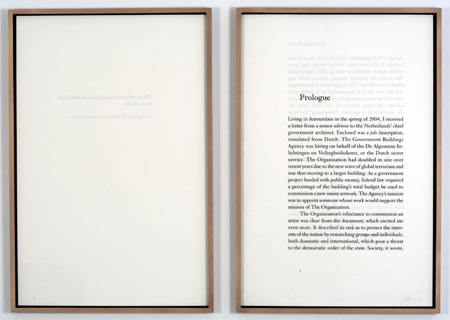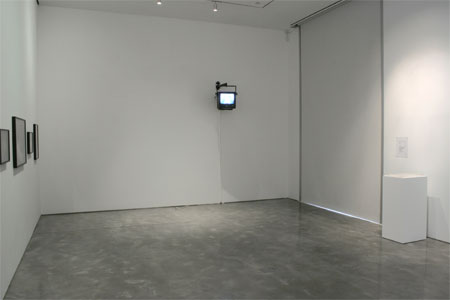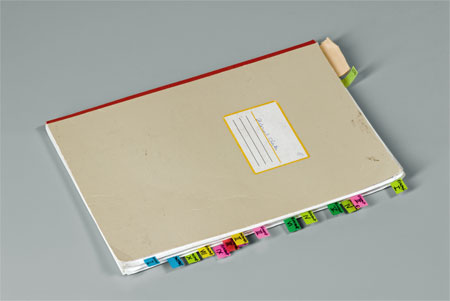
(Courtesy Jill Magid, Courtesy Yvon Lambert Paris, New York)
"The secret itself is much more beautiful than its revelation." Written backward and presented through translucent paper, this text can be deciphered on the obverse of a large framed page of the suppressed novel Becoming Tarden in Jill Magid's solo exhibition at the Yvon Lambert Gallery. On another wall hang seven detailed photographs of banal notebooks with brightly colored tabs and scrawled titles, a white pedestal with a glass case contains a stack of prints neatly wrapped in paper, and a monitor plays a fuzzy live feed from a security camera at the Tate Modern. "Objects to Be Handed Over or Destroyed" documents a project that explores the connections between transparency, secrecy, and, ultimately, power.

(Courtesy Jill Magid, Courtesy Yvon Lambert Paris, New York)
In 2005, the Dutch secret service (AIVD) invited Magid to create a work of art for their headquarters with the dual objective of improving the agency's public image as well as fulfilling a Dutch law requiring new buildings to commission art. In response to their offer, Magid posed as an undercover agent and interviewed members of the AIVD with the intention of giving a personal face to the organization without revealing individual identities. The commission resulted in the exhibition "Article 12" in 2008, but the agency refused to allow the public display of seven prints from the letterpress series "18 Spies", and heavily redacted a manuscript for a novel based on her experience.

(Courtesy Jill Magid, Courtesy Yvon Lambert Paris, New York)
Consistent with her earlier work, Magid's project attempts to personalize, and even lend intimacy to, an institutional system. She begins by entering an organization that is traditionally impenetrable and seemingly omnipotent. Her success in revealing its human side renders the agency unexpectedly vulnerable and asserts the unanticipated power of the artist. In response, the AIVD imposes further restrictions on Magid, creating both a literal and a psychological impasse. She ultimately appeases the secret service by displaying the novel under glass at the Tate Modern and then via closed circuit camera at Yvon Lambert-- a solution that plays with the paradoxical interaction of opacity and visibility, mirroring the constant flip-flop of power between artist and organization. Like French conceptualist Sophie Calle, Magid crosses boundaries to delve into the lives of strangers, but in the end, the project avoids inner reflection, instead commenting on entrenched government systems. Each work in the exhibition exists in an uncertain state of partial transparency, a testimony to the uneasy conflict between pervasive Big Brother organizations and the potential power of the individual.
Jeanne Gerrity is a Brooklyn-based curator and writer. She currently holds the position of Programs Manager at Smack Mellon.

